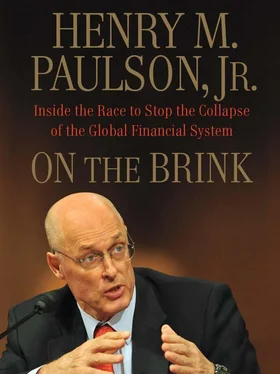We met the rest of our teams on the fourth floor. FHFA’s offices were a contrast to those at the Fed and Treasury, which are grand and spacious, with lots of marble, high ceilings, and walls lined with elegant paintings. FHFA’s offices were drab and cramped, the floors clad in thin office carpet.
As planned, we arrived a few minutes early, and as soon as I saw Lockhart I pulled him aside to buck him up. He was ready but shaky. This was a big step for him.
Our first meeting was with Fannie in a conference room adjacent to Jim’s office. We’d asked both CEOs to bring their lead directors. Fannie chairman Stephen Ashley and general counsel Beth Wilkinson accompanied Mudd. He also brought the company’s outside counsel, H. Rodgin Cohen, chairman of Sullivan & Cromwell and a noted bank lawyer, who’d flown down hastily from New York.
Between our group from Treasury, the Fed’s team, Lockhart’s people, and Fannie’s executives, there must have been about a dozen people in the glass-walled conference room, spread around the main table and arrayed along the walls.
Lockhart went first. He took Fannie Mae through a long, detailed presentation, citing one regulatory infraction after another. Most didn’t amount to much, frankly; they were more like parking tickets in the scheme of things. He was a little nervous and hesitant, but he brought his speech around to the key point: his examiners had concluded there was a capital deficiency, the company was operating in an unsafe and unsound manner, and FHFA had decided to put it into conservatorship. He said that we all hoped they would agree to do this voluntarily; if not, we would seize control. We had already selected a new CEO and had teams ready to move in.
As he spoke I watched the Fannie Mae delegation. They were furious. Mudd was alternately scowling or sneering. Once he put his head between his hands and shook it. In truth, I felt a good bit of sympathy for him. He had been dealt a tough hand. Fannie could be arrogant, even pompous, but Mudd had become CEO after a messy accounting scandal and had been reasonably cooperative as he tried to clean things up.
I followed Lockhart and laid out my argument as simply as I could. Jim, I said, had described a serious capital deficiency. I agreed with his analysis, but added that although I’d been authorized by Congress to do so, I had decided that I was not prepared to put any capital into Fannie in its current form. I told them that I felt Fannie Mae had done a better job than Freddie Mac; they had raised $7.4 billion earlier in the year, while Freddie had delayed and had a bigger capital hole. Now, however, neither could raise any private money. The markets simply did not differentiate between Fannie and Freddie. We would not, either. I recommended conservatorship and said that Mudd would have to go. Only under those conditions would we be prepared to put in capital.
“If you acquiesce,” I concluded, “I will make clear to all I am not blaming management. You didn’t create the business model you have, and it’s flawed. You didn’t create the regulatory model, and it is equally flawed.”
I left unspoken what I would say publicly if they didn’t acquiesce.
Ben Bernanke followed and made a very strong speech. He said he was very supportive of the proposed actions. Because of the capital deficiency, the safety and soundness of Fannie Mae was at risk, and that in turn imperiled the stability of the financial system. It was in the best interests of the country to do this, he concluded.
Though stunned and angry, the Fannie team was quick to raise issues. Mudd clearly thought Fannie was being treated with great injustice. He and his team were eager to put space between their company and Freddie, and the truth was they had done a better job. But I said that for investors it was a distinction without a difference—investors in both companies were looking to their congressional charters and implicit guarantees from the United States of America. The market perceived them as indistinguishable. And that was it. The Fannie executives asked how much equity capital we planned to put in. How would we structure it? We wouldn’t say. We weren’t eager to give many details at all, because we didn’t want to read about it in the press.
“Dan’s too gracious a man to raise this,” said Beth Wilkinson. “But we’re a unified management team. How come he is the only one being fired, and why are you replacing him?”
“I don’t think you can do something this drastic and not change the CEO,” I replied. “Beyond that, frankly, I want to do as little as possible to change management.”
“Our board will want to take a close look at this,” Mudd said, attempting to push back.
Richard Alexander, the managing partner for Arnold & Porter, FHFA’s outside counsel, replied: “I need you to understand that when these gentlemen”—he meant Lockhart, Bernanke, and me—“come to your board meeting tomorrow, it’s not to have a dialogue.”
“Okay,” Rodge Cohen said, and it was clear he understood the game was over.
After the meeting, I made a few quick calls to key legislators. I had learned much, none of it good, since going to Congress in July for unprecedented emergency authorities to stabilize Fannie and Freddie. I had said then that if legislators gave me a big enough weapon—a “bazooka” was what I specifically requested—it was likely I wouldn’t have to use it. But I had not known of the extent of the companies’ problems then. After I had learned of the capital hole, I had been unable to speak about it publicly, so conservatorship would come as a shock, as would the level of taxpayer support. I was also very concerned that Congress might be angered that I had turned temporary authority to invest in Fannie and Freddie, which would expire at year-end 2009, into what effectively was a permanent guarantee on all their debt.
First up were Barney Frank, chairman of the House Committee on Financial Services, and Chris Dodd, his counterpart on the Senate Banking Committee. Barney was scary-smart, ready with a quip, and usually a pleasure to work with. He was energetic, a skilled and pragmatic legislator whose main interest was in doing what he believed was best for the country. He bargained hard but stuck to his word. Dodd was more of a challenge. We’d worked together on Fannie and Freddie reform, but he had been distracted by his unsuccessful campaign for the Democratic presidential nomination and seemed exhausted afterward. Though personable and knowledgeable, he was not as consistent or predictable as Barney, and his job was more difficult because it was much harder to get things done in the Senate. He and his staff had a close relationship with Fannie, so I knew that if they decided to fight, they would go to him.
As it turned out, the calls went well. I explained that what we were doing was driven by necessity, not ideology; we had to preempt a market panic. I knew their initially supportive reactions might change—after they understood all the facts and had gauged the public reaction. But we were off to a good start.
Then I went into the meeting with Freddie. Dick Syron had brought his outside counsel, along with a few of his directors, including Geoff Boisi, an old colleague from my Goldman Sachs days.
We ran through the same script with Freddie, and the difference was clear: Where Mudd had been seething, Syron was relaxed, seemingly relieved. He had appeared frustrated and exhausted as he managed the company, and he looked like he’d been hoping for this to happen. He was ready to do his duty—like the man handed a revolver and told, “Go ahead and do it for the regiment.”
He and his people mostly had procedural issues to raise. Would it be all right for directors to phone in or would they have to come in person? How would the news be communicated to their employees?
Читать дальше












